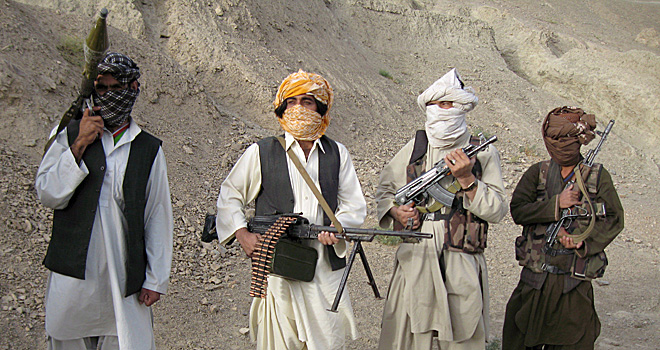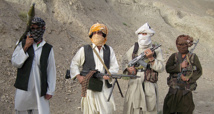Mansour and his two newly named deputies -- influential religious leader Haibatullah Akhundzada and Sirajuddin Haqqani -- are all seen as close to the Pakistani military establishment, the Taliban's longstanding shadowy godfather.
Several Taliban officials told AFP on Friday they regarded Mansour as having "close" or "very close" ties to the Pakistanis.
While there has been no official comment on the Pakistani side, Mansour's appointment was welcomed by retired Brigadier Mehmood Shah.
"Mansour has been running Taliban affairs for two years now, negotiating and organising fighting successfully, so he's fully capable (to take over)," said Shah.
"He might be even better than Mullah Omar because Omar was reclusive."
One of Mansour's deputies, Haqqani, directs the feared Haqqani network, a Taliban faction behind some of the most high-profile attacks in Afghanistan in recent years.
Few doubt the network's connections to Pakistan, to the point that a top US military official in 2011 called the network a "veritable arm" of the country's Inter-Services Intelligence (ISI) agency.
As for the other deputy, Akhundzada, in something of a coincidence he was arrested briefly around 10 days ago by Pakistani forces in the southwestern city of Quetta.
"We think that Pakistan arranged that to prepare him for Mullah Omar's succession process and for what will come next with the peace talks," a Taliban cadre with strong anti-Pakistan views told AFP.
- Prospects for peace? -
Tentative peace efforts between Kabul and the Taliban trying to end the nearly 14-year insurgency made a breakthrough in early July as negotiators met for the first time, in the Pakistani town of Murree.
For years Pakistan quietly supported the Taliban's fight in Afghanistan, even after 2001 when Islamabad joined Washington's "war on terror" alliance, a double game publicly acknowledged earlier this year by former president Pervez Musharraf.
But the dynamics of regional politics have changed in the past 12 months.
The United States is planning to pull its remaining troops out of Afghanistan in 2016 and China has pledged to invest billions of dollars in Afghanistan and Pakistan.
Both have ramped up the pressure on Islamabad to use its leverage to get the Taliban to the talks table.
In Afghanistan the coming to power of President Ashraf Ghani, who has taken a conciliatory approach to Pakistan, and fears about the growing influence of the Islamic State group, have also improved the grounds for talks.
Pakistan organised the meeting in Murree, with a second round planned for this week -- now postponed.
It was in this context that the Afghan government on Wednesday made the bombshell announcement of Omar's death, followed swiftly by Mansour's nomination as his successor.
The same Mansour who had "played an active role for the start of the talks" in Murree, Pakistani journalist and Taliban expert Rahimullah Yousufzai noted.
From there, some top Taliban cadres drew the conclusion that Pakistan had orchestrated the whole thing -- delaying the announcement of Omar's death while they engineered a pliant successor into position.
"The leadership may have hidden from us the fact that our leader was dead for two years, while at same time publishing statements in his name," one militant told AFP.
"Some of the Taliban feel deceived, betrayed. This feeds suspicions about a Pakistani plot."
On Friday, a few hours after Mansour was appointed, voices emerged questioning the selection process, saying it was rushed and even biased.
Mullah Mohammad Hassan Rahmani a member of the Taliban leadership council, told Afghanistan's Shamshad TV that Mansour's election was done with a "limited number of people".
"People are unhappy about it and strongly reject this election -- there are a lot of phone calls from within Afghanistan from people unhappy with what is happening," he said.
"He (Mansoor) has sat with two or three people, giving them money or cars to support him -- this is like throwing dust and thorns in the eyes of people."
These cracks emerging at the highest level of the Taliban leadership will no doubt interest the Islamic State group, which has been seeking to expand its role in Afghanistan by attracting disaffected Taliban fighters.
--------------------------------------------------------------------------------------------------------------------------
Several Taliban officials told AFP on Friday they regarded Mansour as having "close" or "very close" ties to the Pakistanis.
While there has been no official comment on the Pakistani side, Mansour's appointment was welcomed by retired Brigadier Mehmood Shah.
"Mansour has been running Taliban affairs for two years now, negotiating and organising fighting successfully, so he's fully capable (to take over)," said Shah.
"He might be even better than Mullah Omar because Omar was reclusive."
One of Mansour's deputies, Haqqani, directs the feared Haqqani network, a Taliban faction behind some of the most high-profile attacks in Afghanistan in recent years.
Few doubt the network's connections to Pakistan, to the point that a top US military official in 2011 called the network a "veritable arm" of the country's Inter-Services Intelligence (ISI) agency.
As for the other deputy, Akhundzada, in something of a coincidence he was arrested briefly around 10 days ago by Pakistani forces in the southwestern city of Quetta.
"We think that Pakistan arranged that to prepare him for Mullah Omar's succession process and for what will come next with the peace talks," a Taliban cadre with strong anti-Pakistan views told AFP.
- Prospects for peace? -
Tentative peace efforts between Kabul and the Taliban trying to end the nearly 14-year insurgency made a breakthrough in early July as negotiators met for the first time, in the Pakistani town of Murree.
For years Pakistan quietly supported the Taliban's fight in Afghanistan, even after 2001 when Islamabad joined Washington's "war on terror" alliance, a double game publicly acknowledged earlier this year by former president Pervez Musharraf.
But the dynamics of regional politics have changed in the past 12 months.
The United States is planning to pull its remaining troops out of Afghanistan in 2016 and China has pledged to invest billions of dollars in Afghanistan and Pakistan.
Both have ramped up the pressure on Islamabad to use its leverage to get the Taliban to the talks table.
In Afghanistan the coming to power of President Ashraf Ghani, who has taken a conciliatory approach to Pakistan, and fears about the growing influence of the Islamic State group, have also improved the grounds for talks.
Pakistan organised the meeting in Murree, with a second round planned for this week -- now postponed.
It was in this context that the Afghan government on Wednesday made the bombshell announcement of Omar's death, followed swiftly by Mansour's nomination as his successor.
The same Mansour who had "played an active role for the start of the talks" in Murree, Pakistani journalist and Taliban expert Rahimullah Yousufzai noted.
From there, some top Taliban cadres drew the conclusion that Pakistan had orchestrated the whole thing -- delaying the announcement of Omar's death while they engineered a pliant successor into position.
"The leadership may have hidden from us the fact that our leader was dead for two years, while at same time publishing statements in his name," one militant told AFP.
"Some of the Taliban feel deceived, betrayed. This feeds suspicions about a Pakistani plot."
On Friday, a few hours after Mansour was appointed, voices emerged questioning the selection process, saying it was rushed and even biased.
Mullah Mohammad Hassan Rahmani a member of the Taliban leadership council, told Afghanistan's Shamshad TV that Mansour's election was done with a "limited number of people".
"People are unhappy about it and strongly reject this election -- there are a lot of phone calls from within Afghanistan from people unhappy with what is happening," he said.
"He (Mansoor) has sat with two or three people, giving them money or cars to support him -- this is like throwing dust and thorns in the eyes of people."
These cracks emerging at the highest level of the Taliban leadership will no doubt interest the Islamic State group, which has been seeking to expand its role in Afghanistan by attracting disaffected Taliban fighters.
--------------------------------------------------------------------------------------------------------------------------









 Home
Home Politics
Politics











